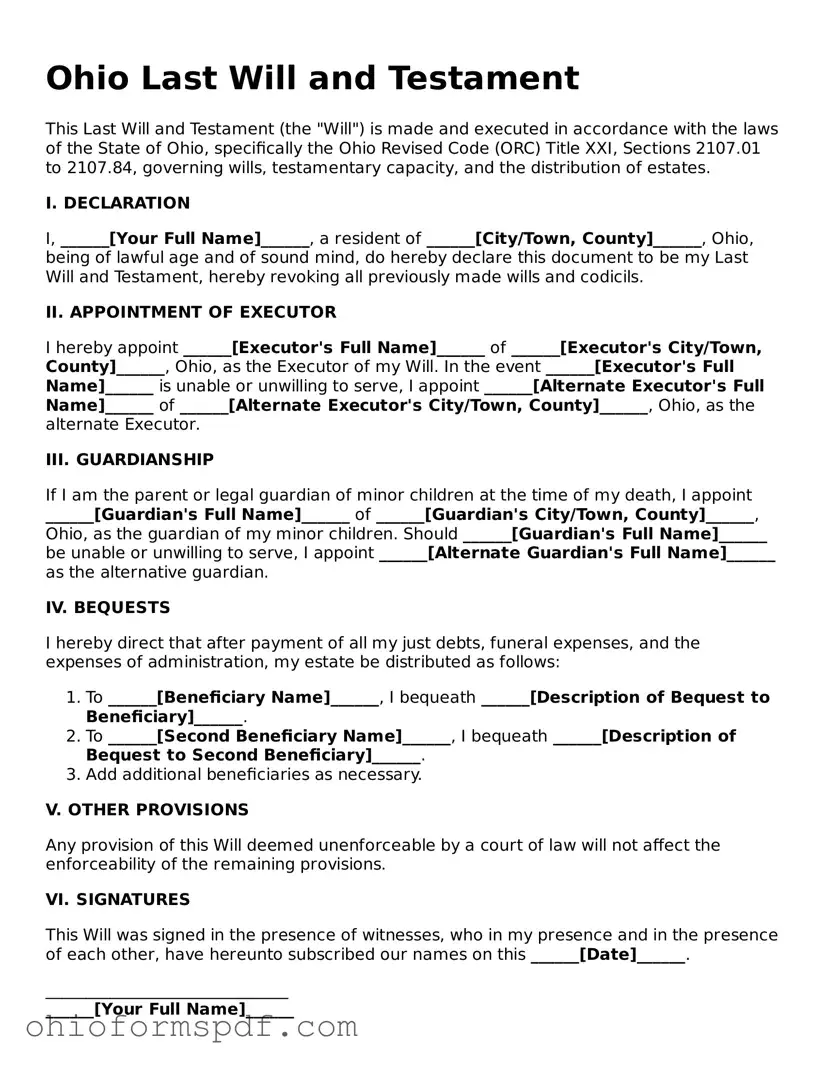Ohio Last Will and Testament
This Last Will and Testament (the "Will") is made and executed in accordance with the laws of the State of Ohio, specifically the Ohio Revised Code (ORC) Title XXI, Sections 2107.01 to 2107.84, governing wills, testamentary capacity, and the distribution of estates.
I. DECLARATION
I, ______[Your Full Name]______, a resident of ______[City/Town, County]______, Ohio, being of lawful age and of sound mind, do hereby declare this document to be my Last Will and Testament, hereby revoking all previously made wills and codicils.
II. APPOINTMENT OF EXECUTOR
I hereby appoint ______[Executor's Full Name]______ of ______[Executor's City/Town, County]______, Ohio, as the Executor of my Will. In the event ______[Executor's Full Name]______ is unable or unwilling to serve, I appoint ______[Alternate Executor's Full Name]______ of ______[Alternate Executor's City/Town, County]______, Ohio, as the alternate Executor.
III. GUARDIANSHIP
If I am the parent or legal guardian of minor children at the time of my death, I appoint ______[Guardian's Full Name]______ of ______[Guardian's City/Town, County]______, Ohio, as the guardian of my minor children. Should ______[Guardian's Full Name]______ be unable or unwilling to serve, I appoint ______[Alternate Guardian's Full Name]______ as the alternative guardian.
IV. BEQUESTS
I hereby direct that after payment of all my just debts, funeral expenses, and the expenses of administration, my estate be distributed as follows:
- To ______[Beneficiary Name]______, I bequeath ______[Description of Bequest to Beneficiary]______.
- To ______[Second Beneficiary Name]______, I bequeath ______[Description of Bequest to Second Beneficiary]______.
- Add additional beneficiaries as necessary.
V. OTHER PROVISIONS
Any provision of this Will deemed unenforceable by a court of law will not affect the enforceability of the remaining provisions.
VI. SIGNATURES
This Will was signed in the presence of witnesses, who in my presence and in the presence of each other, have hereunto subscribed our names on this ______[Date]______.
______________________________
______[Your Full Name]______
Testator/Testatrix
Witnesses:
- ______________________________
Name: ______[Witness #1 Full Name]______
Address: ______[Witness #1 Address]______
- ______________________________
Name: ______[Witness #2 Full Name]______
Address: ______[Witness #2 Address]______
This document was completed in accordance with the requirements of Ohio law and represents the Last Will and Testament of ______[Your Full Name]______.

